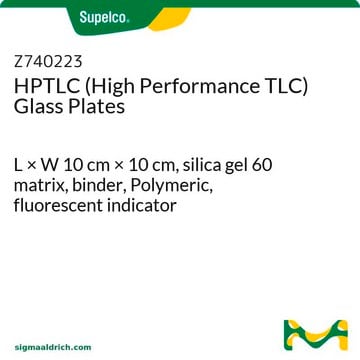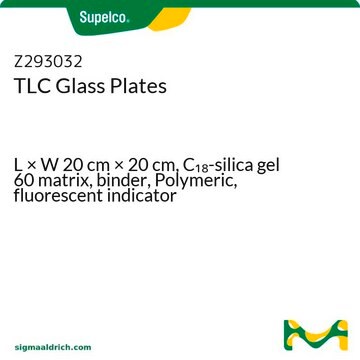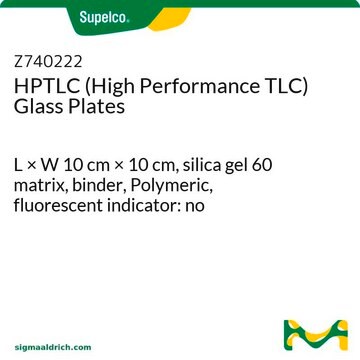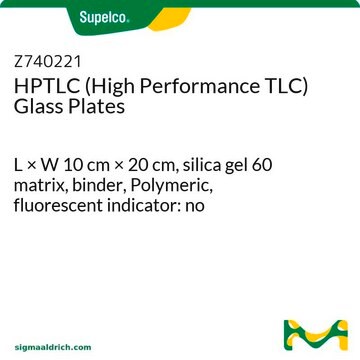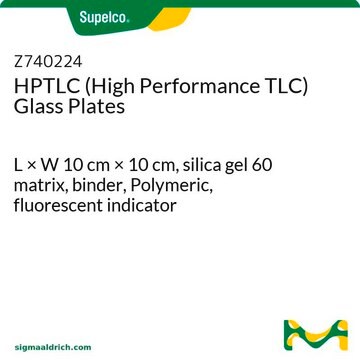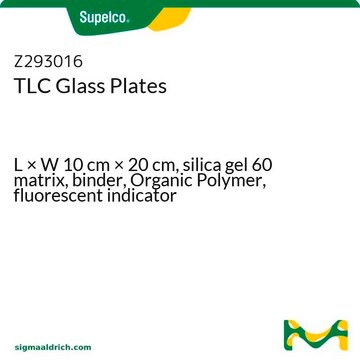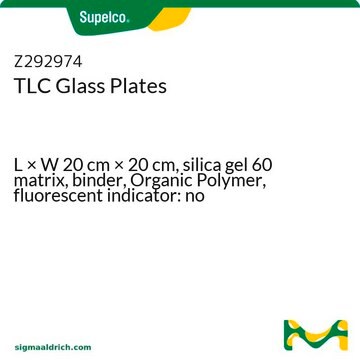Z740220
HPTLC (High Performance TLC) Glass Plates
L × W 10 cm × 20 cm, silica gel 60 matrix, binder, Polymeric, fluorescent indicator
동의어(들):
High-performance Thin-layer Chromatography Glass Plates
로그인조직 및 계약 가격 보기
모든 사진(1)
About This Item
UNSPSC 코드:
41115711
NACRES:
NC.07
길이 × 너비:
10 cm × 20 cm
레이어 두께:
200 μm
특징:
binder Polymeric
fluorescent indicator
fluorescent indicator
공극 크기:
60 Å pore size
추천 제품
애플리케이션
- Pharmaceutical Analysis: HPTLC glass plates are widely used in the pharmaceutical industry for the quality control and analysis of active pharmaceutical ingredients (APIs) and their impurities. Recent research highlights the development of an HPTLC method for the estimation of piperine in Piper species and marketed formulations. This application is crucial for ensuring the quality, safety, and efficacy of pharmaceutical products (Balekundri et al., Green Analytical Chemistry, 2024).
- Environmental Monitoring: HPTLC glass plates are used in environmental studies to detect and quantify pollutants in water, soil, and air samples. The plates′ robustness and reproducibility are crucial for monitoring environmental contaminants and assessing pollution levels. Advanced HPTLC methods utilizing these plates contribute to effective environmental protection and regulatory compliance (Akpomie et al., International Journal of Environmental Analytical Chemistry, 2024).
- Food and Beverage Analysis: In food safety analysis, HPTLC glass plates are employed to detect residues of contaminants such as pesticides, mycotoxins, and food additives in various food products. The high sensitivity and specificity of the plates ensure accurate quantification, making them indispensable for routine food safety monitoring and quality control (Gokbulut, Current Analytical Chemistry, 2021).
- Herbal Medicine and Natural Products: HPTLC glass plates are extensively used in the analysis of herbal medicines and natural products. They enable the simultaneous separation and quantification of multiple compounds, facilitating the quality control and standardization of herbal formulations. Research has demonstrated their application in fingerprinting and quantifying essential oils and other bioactive compounds in medicinal plants (Naik and Sellappan, Analytical Chemistry Letters, 2020).
- Method Development and Validation: The use of HPTLC glass plates in method development and validation is essential for ensuring the accuracy and reliability of analytical results. These plates allow for the optimization of chromatographic conditions, improving the efficiency and robustness of analytical procedures. Recent advancements in HPTLC have focused on developing eco-friendly and sustainable analytical methods, contributing to greener practices in analytical chemistry (Sharma et al., Analytical Chemistry Letters, 2021).
법적 정보
EMD Millipore is a registered trademark of Merck KGaA, Darmstadt, Germany
가장 최신 버전 중 하나를 선택하세요:
이미 열람한 고객
자사의 과학자팀은 생명 과학, 재료 과학, 화학 합성, 크로마토그래피, 분석 및 기타 많은 영역을 포함한 모든 과학 분야에 경험이 있습니다..
고객지원팀으로 연락바랍니다.
